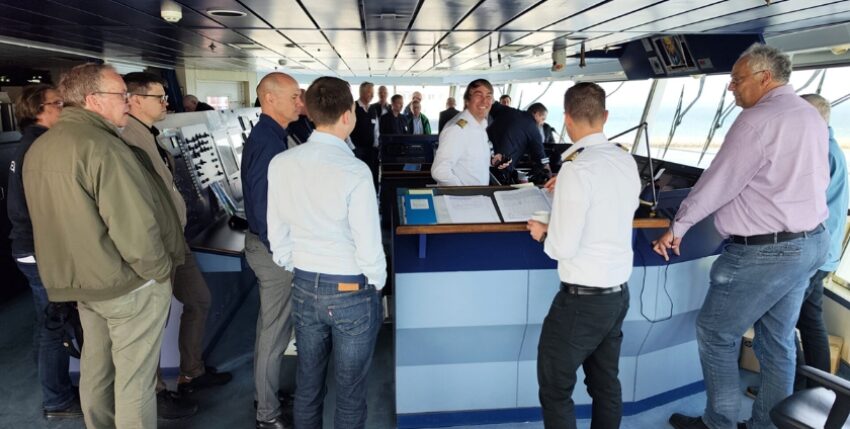Onboard event provides impetus for improving ship operations
What will the all-electric operation of a ferry look like in the future? How can alternative light sources improve energy efficiency? How can blind journeys be avoided? These questions were the focus of the latest event organised by the Maritime Cluster Northern Germany (MCN). On board the Scandlines hybrid ferry "Schleswig-Holstein", interested parties from shipyards, suppliers and shipping companies as well as from the MCN Ship Efficiency Specialist Group learnt about this forward-looking topic in a practical way during operation. The trip took them from Puttgarden to Rødby and back on Tuesday, 29 April.
"I am delighted that so many participants from various segments of the maritime industry accepted our invitation," said Oliver Malmström, MCN branch manager in Mecklenburg-Vorpommern. Under the title "Ship efficiency - reducing emissions through retrofitting and electrification", various speakers gave exciting insights into ways of reducing emissions and the prospects for future developments. "It is important for us to discuss ways of reducing emissions, as the regulatory pressure on companies to do so is high. In addition, solutions for optimising ship efficiency offer great potential for promoting innovation," added Malmström.
Marko Möller, Head of Business Administration and Special Projects at the Scandlines Germany GmbHabout the opportunities and also the challenges on the way to a fully electric ferry. "In recent years, we have focussed on a battery-supported hybrid system for our ferries, which has significantly improved the efficiency and therefore the energy balance of the engines. Other projects that we have implemented include the installation of rotor sails and optimised propellers." The shipping company's largest current projects involve the commissioning of a 100 per cent battery-electric cargo ferry in the course of 2025 and the conversion of two Vogelfluglinie ferries to at least 80 per cent battery operation. In addition to the "Deutschland", this concerns the "Schleswig-Holstein", the venue of the Ship Efficiency Expert Group.
The topic of "Retrofitting lighting systems on seagoing vessels" was addressed by Jens Borchhardt from the Wismar University of Applied Sciences. "Replacing the light sources on board is worthwhile from an economic and ecological point of view. LEDs are more energy-efficient, mechanically more robust and more durable. What's more, they can be replaced during operation," he explained. The only problem is the change in power consumption when switching on compared to the replaced light source. "However, this can be solved in advance with appropriate electrical planning on board."
The presentation was underpinned by practical examples from Tim Koch-Losekamm from the Karl Dose GmbH. "The cheapest solution is not always the best solution. Vibration, corrosion and ambient temperature also play an important role when converting to LED lighting on board ships," explained the lighting expert. In order to reduce power consumption, a lighting calculation is also useful. In this way, it can be determined exactly whether the number of lights could be reduced at the same time by switching over.
The presentation "Avoiding blind sailing - guidelines for the successful evaluation of propulsion-improving measures" by Richard Marioth, Head of the MCN Ship Efficiency Group and Managing Director of Idealship GmbHrounded off the five-hour trip on the MS Schleswig-Holstein. Richard Marioth: "Reliable operating data, high-quality reference models and clear processes at shipping companies are required for the evaluation of retrofits. It is important to collect consistent comparative data before a retrofit."
The background to the event was also the FuelEU Maritime Regulation as a directive for the decarbonisation of maritime transport and the goal of the International Maritime Organisation (IMO) to achieve net-zero emissions in international maritime transport by 2050. The Ship Efficiency Expert Group has been working for several years on the MCN Guide Ship Efficiency as a guide for stakeholders from industry and science on ship efficiency. The findings and dialogue from the onboard event on the MS Schleswig-Holstein are being incorporated into the guide and are another important building block from practical application.
Text and photo: MCN Northern Germany 30.04.2025







